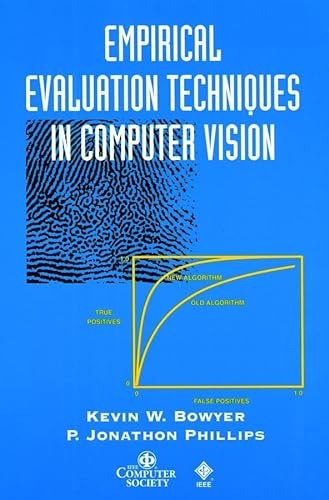Artículos relacionados a Empirical Evaluation Techniques in Computer Vision:...

Sinopsis
The two main motivators in computer vision research are to develop algorithms to solve vision problems and to understand and model the human visual system. This work focuses on developing solutions to vision problems from the computer vision and pattern recognition community's point of view.
Empirical Evaluation Techniques in Computer Vision covers methods that allow comparative assessment of algorithms and the accompanying benefits:
- Places computer vision on solid experimental and scientific grounds
- Assists the development of engineering solutions to practical problems
- Allows accurate assessments of computer vision research
- Provides convincing evidence that computer vision research results in practical solutions
Empirical evaluations are divided into three basic categories providing useful insights into computer vision algorithms. Independently administered evaluations make up the first category. The second is evaluations of a set of classification algorithms by one group. The third category is composed of problems where the ground truth is not self evident. A major component of the evaluation process is to develop a method of obtaining the ground truth.
Empirical evaluations of algorithms are slowly emerging as a serious subfield in computer vision. The text builds a foundation for developing accepted practices for evaluating algorithms that determine the strengths and weaknesses of different approaches while identifying necessary further research. Successful evaluations can help convince potential users that an algorithm has matured to the point that it can be successfully fielded.
"Sinopsis" puede pertenecer a otra edición de este libro.
Acerca del autor
Kevin W. Bowyer is the author of "Your Call," an ethics and computing column in Computer magazine, and served as chair of the Social, Ethical, Legal and Professional Issues focus group for the Year 2001 Model Curricula for Computing. He has also led workshops on Teaching Ethics and Computing for undergraduate faculty sponsored by the National Science Foundation. Currently, he is editor in chief of IEEE Transactions on Pattern Analysis and Machine Intelligence and is a member of editorial boards for several other journals. Dr. Bowyer's research interests include image understanding, pattern recognition, and medical image analysis. His research work has been supported by the National Science Foundation, Defense Advanced Research Projects Agency, the Air Force Office of Scientific Research, the Army Medical Research and Material Command, NASA, and other agencies. Presently, Dr. Bowyer is professor of computer science and engineering at the University of South Florida, where he has received numerous distinguished teaching awards. Previously, he was a computer science faculty member at Duke University and the Institute for Informatics at the Swiss Federal Technical Institute in Zurich. Dr. Bowyer is an IEEE Fellow.
De la contraportada
In the last decade, as computer vision has matured, methods to evaluate the performance of computer vision algorithms have been developed. The interest is motivated by a desire to place computer vision on solid experimental and scientific grounds, and to facilitate the transfer of algorithms from the laboratory to the marketplace.
The growth of the evaluation field has seen the development of numerous practices and methodologies for evaluating algorithms. The text builds a foundation for developing accepted practices for evaluating algorithms that determine the strengths and weaknesses of different approaches while identifying future research directions.
Empirical Evaluation Techniques in Computer Vision presents methods that allow comparative assessment of algorithms and the accompanying benefits:
- places computer vision on solid experimental and scientific grounds
- assists the development of engineering solutions to practical problems
- allows accurate assessments of computer vision research
- provides convincing evidence that computer vision research results in practical solutions
The chapters in this volume cover the three main paradigms for evaluating computer vision algorithms. The paradigms are: (1) evaluations that are independently administered, (2) evaluation of a set of algorithms by one research group, and (3) evaluation methods that feature ground truthing procedures as a major component. Topics covered include evaluating edge detectors, face recognition algorithms, medical image registration algorithms, graphics recognition algorithms, and performance assessment by resampling methods.
"Sobre este título" puede pertenecer a otra edición de este libro.
EUR 22,50 gastos de envío desde Francia a Estados Unidos de America
Destinos, gastos y plazos de envíoResultados de la búsqueda para Empirical Evaluation Techniques in Computer Vision:...
Empirical Evaluation Techniques in Computer Vision
Librería: Ammareal, Morangis, Francia
Softcover. Condición: Très bon. Ancien livre de bibliothèque. Edition 1998. Ammareal reverse jusqu'à 15% du prix net de cet article à des organisations caritatives. ENGLISH DESCRIPTION Book Condition: Used, Very good. Former library book. Edition 1998. Ammareal gives back up to 15% of this item's net price to charity organizations. Nº de ref. del artículo: E-521-542
Cantidad disponible: 1 disponibles
Empirical Evaluation Techniques in Computer Vision (Practitioners)
Librería: DFTP Holdings, DAYTON, OH, Estados Unidos de America
Paperback. Condición: Good. - BOOK IN GREAT CONDITION - -Used Texts May Have Used Book Stickers on the Cover. Used texts may NOT contain supplemental materials such as CD's, info-trac, access codes, etc. Satisfaction Guaranteed! Nº de ref. del artículo: 2005529
Cantidad disponible: 1 disponibles
